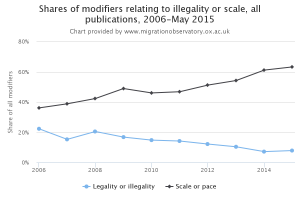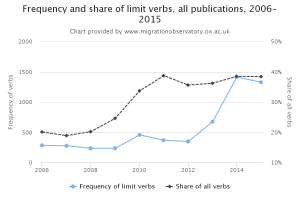The issue of immigration prominently featured in debates leading up to the June 2016 EU Referendum vote. It was argued that too many people were entering the UK, largely from other EU member states. Politicians and media also talked about ‘taking back control’—notably in the contexts of deciding who can enter Britain and enforcing borders. But, as our new Migration Observatory report ‘A Decade of Immigration in the British Press’ reveals through corpus linguistic methods, such language wasn’t necessarily new: in fact, under the coalition government from 2010-2015, the press was increasingly casting migration in terms of its scale or pace. And, the relative importance of ‘limiting’ or ‘controlling’ migration rose over this period, too.
Our report aimed to understand how British press coverage of immigration had changed in the decade leading up to the May 2015 General Election. We built upon previous research done at Lancaster University (headed by CASS Deputy Director Paul Baker) into portrayals of migrant groups. Our corpus of 171,401 items comes from all 19 national UK newspapers (including Sunday versions) that continuously published between January 2006 and May 2015. Using the Sketch Engine, we identified the kinds of modifiers (adjectives) and actions (verbs) associated with the terms ‘immigration’ and ‘migration’.
The modifiers that were most frequently associated with either of these terms included ‘mass’ (making up 15.7% of all modifiers appearing with either word), ‘net’ (15.6%), and ‘illegal’ (11.9%). Closer examination of the top 50 modifiers revealed a group of words related to the scale or pace of migration: in addition to ‘mass’ and ‘net’, these included terms such as ‘uncontrolled’, ‘large-scale’, ‘high’, and ‘unlimited’. Grouping these terms together, and tracking their proportion of all modifiers compared to those related to illegality—which is another prominent way of referring to immigrants—reveals how these terms made up an increasingly larger share of modifiers under both the Labour and coalition governments since 2006. Figure 1 shows how these words made up nearly 40% of all modifiers in 2006, but over 60% in the five months of 2015. Meanwhile, the share of modifiers referring to legal aspects of immigration (‘illegal’, ‘legal’, ‘unlawful’, or ‘irregular’) declined from 22% in 2006 to less than 10% in January-May 2015.
Figure 1.

Another way of examining this dimension of ‘scale’ or ‘pace’ is to look at the kinds of actions (verbs) done to ‘immigration’ or ‘migration’. For example, in the sentences ‘the government is reducing migration’ and ‘we should encourage more highly-skilled immigration’, the verbs ‘reduce’ and ‘encourage’ signal some kind of action being done to ‘immigration’ and ‘migration’. In a similar way to Figure 1, we looked at the most frequent verbs associated with either term. A category of words expressing efforts to limit or control movement—what we call ‘limit’ verbs in the report—emerged from the top 50 verbs. These included examples such as ‘control’, ‘tackle’, ‘reduce’, and ‘cap’.
Figure 2 shows how the overall frequency of these limit verbs, indicated by the solid line, rose by about five times between 2006 and the high point in 2014—most notably from 2013. But, as a share of all verbs expressing some action towards ‘immigration’ or ‘migration’, this category was consistently making up 30-40% from 2010 onwards. This suggests that, although these kinds of words weren’t that frequent in absolute terms until 2014, the press had already started moving towards using them from 2010.
Figure 2.
These results show how the kind of language around immigration has changed since 2006. Corpus methods allow us to look at a large amount of text—in this case, over a significant period of time in British politics—in order to put recent rhetoric in its longer context. By doing so, researchers contribute concrete evidence about how the British press has actually talked about migrants and migration. Such evidence opens timely and important debates about the role of the press in public discussion (how does information presented through media impact public opinion?) and the extent to which press outputs should be scrutinised.
About the author: William Allen is a Research Officer with The Migration Observatory and the Centre on Migration, Policy, and Society (COMPAS), both based at the University of Oxford. His research focuses on the ways that media, public opinion, and policymaking on migration interact. He also is interested in the ways that migration statistics and research evidence is used in non-academic settings, especially through data visualisations.

